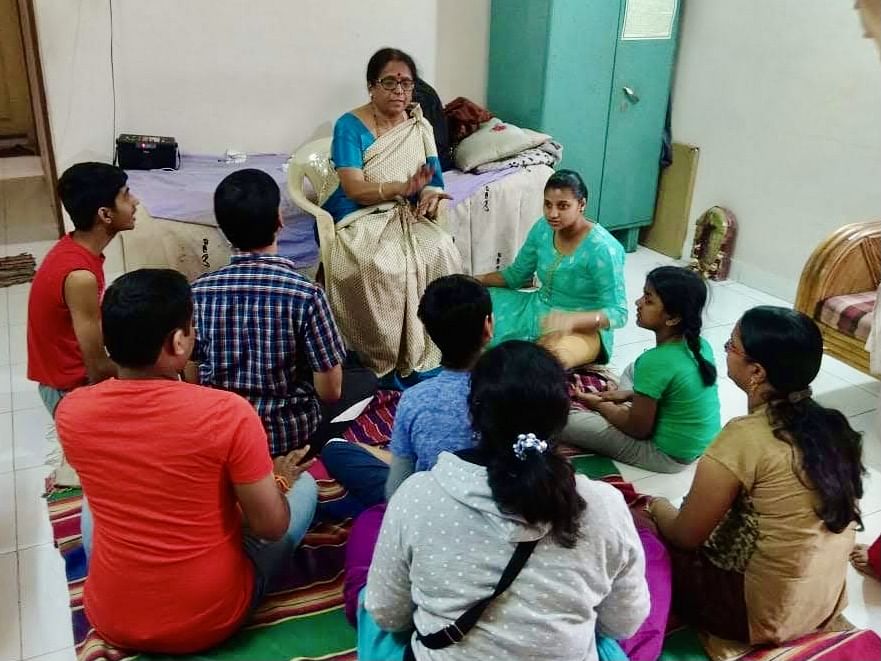
he demand for music therapy has gone up in the pandemic months, therapists say.
When the second wave of Covid-19 rocked the country, many turned to music to find healing.
Music therapy is the clinical use of music to reduce stress. It is also known to address breathing problems.
In passive music therapy, one listens to music selected by an expert. Active music therapy requires one to write, sing and compose music.
“The sessions are tailored to suit the requirements of individuals. While active music therapy might work wonders for some, passive therapy sometimes helps individuals achieve their goals,” says Dr Karuna Nagarajan, associate professor, Swami Vivekananda Yoga Anusandhana Samsthana and managing trustee, Svaraveda Foundations.
A vocalist trained under Girija Nagarajan and late Srirangamma and Narasamma, Karuna offers a three-month music therapy course at Svaraveda Foundations, located in Jigani on the southern outskirts of Bengaluru. The course is open not just to medical professionals, but to people from all walks of life.
“Apart from helping those who lost their kin due to the pandemic heal, music therapy proved to be helpful for recovering Covid patients. Combined with yoga, it has been effective,” she says.
Dr Meenakshiravi, founder of Meera Center for Music Therapy, Education and Research, Bengaluru, discovered the benefits of music therapy at a young age.
“I used to deal with asthma growing up. But, once I started to sing regularly every morning, my condition began to heal. As I grew more consistent, my asthma attacks stopped. This is why it is so useful to recovering Covid patients,” she says.
Meenakshiravi, who had worked as a counsellor for many years, used her background in music to help people deal with their trauma.
“I would have them sing and chant certain sounds along with me. This would help release their anxiety and bring a sense of calmness. I would encourage them to write poems and sing songs. These exercises helped them put their trauma into perspective and increased the chances of overcoming it,” she says.
Treating trauma
Meenakshiravi launched the Manollasini Trust for the specially-abled in 2006 and has been treating disorders such as autism and schizophrenia with music therapy. She also conducts six-month courses to train therapists.
Children with disabilities often face difficulties in expressing what they feel. This leads to feelings of confusion, frustration, and helplessness. Music is useful to them, she says.
“Kids who often have a hard time focusing and dealing with disorders like ADHD find it easier to learn concentration through music. With certain forms of music and rhythm therapy, we also teach them coordination, which helps them carry out several daily functions,” she explains.
Apart from these cognitive skills, music therapy also helps specially-abled children become confident.
“When you look at a kid with developmental disorders, often the focus is on things that they cannot do. But music therapy helps them shine by focusing on their strengths. It improves their speech and has a positive impact on their self-confidence. This is what happened to my son,” says Preethi (name changed on request), mother of a specially-abled child.
Robert (name changed), in his mid-20s, deals with blindness, hearing problems, and juvenile diabetes. He started music therapy 10 years ago. He learned how to sing and also improved his speech tremendously.
“Our music therapy sessions often include both children and their parents. In our society, there is a lot of stigma attached to disabilities. Joint therapy helps parents understand their kids better,” says Meenakshiravi.
Where you can learn
Meera Center for Music Therapy, Education and Research: Six-month course for Rs 10,000. (The organisation is providing the course to rural citizens at a reduced cost.) For details, contact: 95151 24782
Svaraveda Foundations: Three-month course for Rs 17,000. For details, contact: 94495 38875